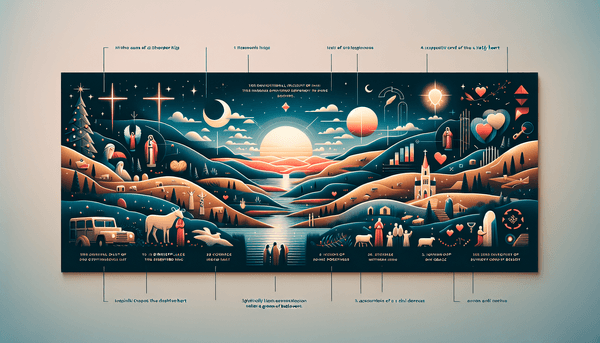The Temptation of Jesus and the Incarnation
While God in His divine nature cannot be tempted, the mystery of the Incarnation reveals Jesus Christ who, though fully divine, also became fully human and thus experienced temptation. This profound truth is encapsulated in Hebrews 4:15, which tells us that Jesus 'has been tempted in every way, just as we are—yet he did not sin.' Jesus's earthly life included moments such as the wilderness temptation (Matthew 4:1-11), where He faced the same challenges we do, yet without succumbing to sin. This dual nature of Christ has significant theological implications, demonstrating God's deep love and understanding for humanity. It also assures us that through Jesus, we have someone who empathizes with our weaknesses and can help us in our struggles with temptation, as promised in 1 Corinthians 10:13 and illustrated by Christ's own example of humility and obedience (Philippians 2:5-8).
The Biblical Account of Creation and the Universe
The Genesis narrative offers a majestic portrayal of God's creative work, from the calling forth of light to the formation of the Earth and the heavens. While the ancient text does not detail 'outer space' as we understand it today, it does not diminish the scope of God's creation, which is inclusive of the entire cosmos. Verses like Psalm 19:1, 'The heavens declare the glory of God; the skies proclaim the work of His hands,' and Isaiah 40:26, 'Lift up your eyes and look to the heavens: Who created all these?' point to a divine artistry that is both boundless and intricate. The role of Christ in this cosmic narrative is also highlighted in Colossians 1:16, which states that 'all things have been created through Him and for Him.' The Creation story serves as a testament to the omnipotence and sovereignty of God, who is both the origin and sustainer of all that exists. For those seeking to navigate the complexities of a spiritual journey, understanding this narrative can be pivotal, as explored in our blog post on faith's journey through doubt and discovery.
The Biblical Perspective on Being Spiteful
Spitefulness, a behavior that can poison relationships and communities, is addressed in the Bible with a clear call to love and forgiveness. The teachings of Scripture advocate for the rejection of spite and the embrace of behaviors that foster reconciliation and peace. Ephesians 4:31-32 urges believers to 'get rid of all bitterness, rage and anger, brawling and slander, along with every form of malice,' and instead to be kind and compassionate, forgiving one another. This reflects the broader biblical principle found in Proverbs 10:12, that 'love covers all offenses,' and the commandment of Jesus to love not just our neighbors but also our enemies, as stated in Matthew 5:44. By following these teachings, believers are called to live out the love of Christ, avoiding actions that lead to discord and instead pursuing actions that build up the body of Christ in unity and love.
Conclusion
In conclusion, our journey through these biblical themes reinforces the intricate relationship between God's holiness, the human experience of Jesus, the vastness of Creation, and the moral guidance provided for our daily lives. As we consider the sinlessness of God, the empathetic temptation of Jesus, the grandeur of the cosmos created by God's word, and the call to reject spiteful behavior, we gain a richer understanding of the divine narrative and its implications for us. This exploration, akin to understanding the profound metaphor of the Lord as a shepherd, should inspire us to deeper reflection, greater worship, and a more profound commitment to embodying the values taught in Scripture, as we walk in the light of God's love and truth.
FAQ
Q: Can God be tempted by evil?
A: According to James 1:13, God cannot be tempted by evil, nor does He tempt anyone. This verse reflects the belief that God is without sin and is completely righteous.
Q: How was Jesus tempted if He is God?
A: Jesus, being fully God and fully human, was tempted as part of his human experience. Hebrews 4:15 says, 'For we do not have a high priest who is unable to empathize with our weaknesses, but we have one who has been tempted in every way, just as we are—yet he did not sin.' This illustrates that Jesus experienced temptation, yet remained without sin.
Q: Did God create outer space?
A: The biblical account of Creation focuses on the formation of the Earth and the heavens, and it is understood that God's creative power extends to the entire universe. Passages such as Genesis 1:1 and Psalm 19:1 affirm the belief that God created all things, including what we refer to as outer space.
Q: What does the Bible say about being spiteful?
A: The Bible advises against being spiteful and encourages believers to live in love and forgiveness. Ephesians 4:31-32, for example, calls for putting away bitterness and spite, emphasizing kindness and compassion instead.






